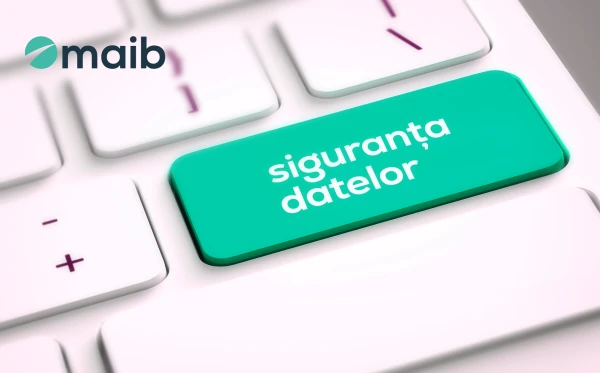The end of the year is known not only for its holiday spirit and magical atmosphere but also because the number of bank card scams has increased in recent years.
For example, in November only, Poșta Moldovei registered more than 450 complaints from people who suffered from phishing scams. Tempted by attractive offers placed on the phishing page on behalf of Poșta Moldovei, users entered their data, and their money was stolen.
Irina Prisăcari, Head of the maib Card Security Group, was invited to the newscast on Moldova 1 to give details on protecting ourselves from scams.
The expert mentioned that one of the fraud methods is that people place ads to sell goods, and the scammers contact them as potential buyers. They claim that they are in another location and would like the goods delivered via Poșta Moldovei, sending a phishing link to the person so that they can enter their card details to confirm delivery. Thus, the fraudulent extraction of financial sources from the person's card occurs.
"We urge customers to be vigilant about the links they access the name of the link because a sign of a non-compliant link is that it is very sophisticated. We also urge people to be careful where they enter and to whom they give their card details," says Irina Prisăcari.
Today's many known fraud methods include hacking into social media accounts and sending alarming messages demanding money to friends and relatives.
"In such cases, we recommend that customers contact the friend personally and confirm that it is true," says the expert.
Another scam method is contacting customers by people claiming to be bank employees who say they want to confirm a particular banking transaction. To do this, they request card data, and the fraudulent transaction occurs. Please note that bank representatives never ask for card details or the OTP password received via SMS.
At the same time, shopping fraud schemes are widespread during the holiday season. Ads are placed on social media selling products at a very attractive price and asking for an advance payment or even the full amount to receive. As a result, the page is removed, and the goods are no longer delivered.
"Our advice is to be as vigilant as possible and question every potential online purchase. If in doubt, contact your bank and ensure that a previous bank employee has approached you. Check the websites where you intend to buy something. Look for reviews and find out if other buyers have received the products in question, familiarise yourself with the terms and conditions of the site and don't believe in huge discounts", concludes expert Irina Prisăcari.
Be careful and keep your bank data safe!


 maibank
maibank
 maib business app
maib business app
 online loans – legal entities
online loans – legal entities
 internet banking - individuals
internet banking - individuals
 new internet banking - maib business
new internet banking - maib business
 internet Banking - BankFlex
internet Banking - BankFlex




